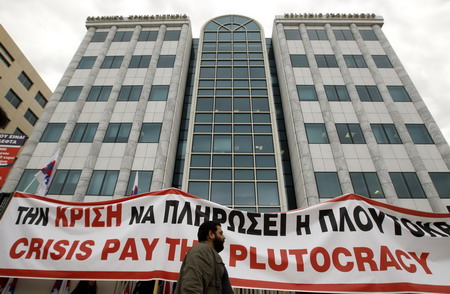Nationwide strike in Greece against austerity plan
Greek unions staged a nationwide strike Wednesday, grounding flights, shutting schools and crippling public services, in a show of strength against government austerity measures aimed at pulling the debt-ridden country out of financial crisis.
 |
|
A protester walks in front of a banner placed at the main entrance of the Athens Stock exchange in Athens February 23, 2010. A group of about 150 trade union protesters blocked entrances to the Athens stock exchange building on Tuesday but bourse officials said they expected trade to go ahead normally. [Agencies] |
In the first general strike since the center-left government's election in October, all flights to and from Greek airports have been canceled, while trains and ferries are also idle.
Commuters in Athens were left without most forms of public transport. Public schools, tax offices and municipal offices are closed, while public hospitals are using emergency staff.
Journalists are also holding a 24-hour strike, and two separate demonstrations are planned for central Athens.
The country's two largest umbrella labor groups, the private sector GSEE and public sector ADEDY, fiercely oppose a wave of belt-tightening measures announced over the past weeks to reduce the bloated budget deficit from 12.7 percent of gross domestic product to 8.7 percent this year.
"If all these measures are enforced, unemployment will skyrocket. Our country will enter a massive recession and unemployment will reach a Europe-wide record," said GSEE spokesman Stathis Anestis.
"This will be tragic because it will provoke social (unrest) and clashes."
Greek unemployment hit a five-year high of 10.6 percent in November 2009, up from 9.8 percent in October. The country's woes have affected confidence in the euro as a common currency, and hiked the country's borrowing costs.
The governing Socialists have frozen civil service wages and hiring while cutting bonuses, hiking consumer taxes and raising retirement ages.
Greece, however, is facing a March 16 deadline from the European Union to show signs of fiscal improvement and is under pressure to take additional measures. These could include a hike in the Value Added Tax, currently at 19 percent, and further civil service bonus cuts.
Wednesday's strike will be a crucial test of support for the unions, with polls showing strong public support for the government's austerity plan.
A poll Sunday in the Ethnos newspaper showed some 57.6 percent of Greeks believe measures taken so far are "in the right direction," while 75.8 percent think unions should show restraint until the end of the crisis.
 0
0 







Go to Forum >>0 Comments